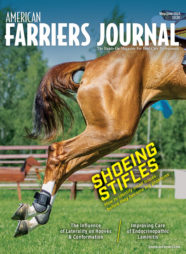Advertise Follow Us
Articles by Jeremy McGovern
Don’t throw away your worn riveted tools when they could be refurbished for extended lives
Read More
Digital Farrier Series
Developing Your Web Site's Design
Make sure your site’s presentation represents your business well and offers ways to help your footcare practice grow
Read More
Horseshoeing History Made in Missouri
Eleven farriers participate in the first Worshipful Company of Farriers examination held outside of the United Kingdom
Read More
Digital Farrier Series
Defining your Web Site's Mission
Whether your business’s site presents a boilerplate message or is an intricate information source, determine what it should be before creating it
Read More
Confidence to Handle High-End Performance Horses
Veteran farriers weigh in on how to improve your confidence for working with moneymaking horses
Read More
Improving your Farrier Practice
If you want to grow your business, you better be prepared to invest in your education, develop strong customer skills and be ready for self-evaluation
Read More
Alternatives to Traditional Shoes
Having proved themselves much more than a fad years ago, non-metal shoes have become essential tools for many farriers in helping horses
Read More
Toe Grabs Up to 4 mm are OK
The Jockey Club’s Thoroughbred Safety Committee modifies its previous recommendation regarding toe grabs, which may lead farriers and trainers to adjust and manufacturers and dealers to scramble
Read More
Navigating From A To B In Your Shoeing Rig
Make sure you can afford everything that goes along with your shoeing rig.
Read More
Not Ready To Start Out On Your Own? Find An Apprenticeship
Ask trainers, horse owners, veterinarians and others about quality farriers in the area.
Read More









